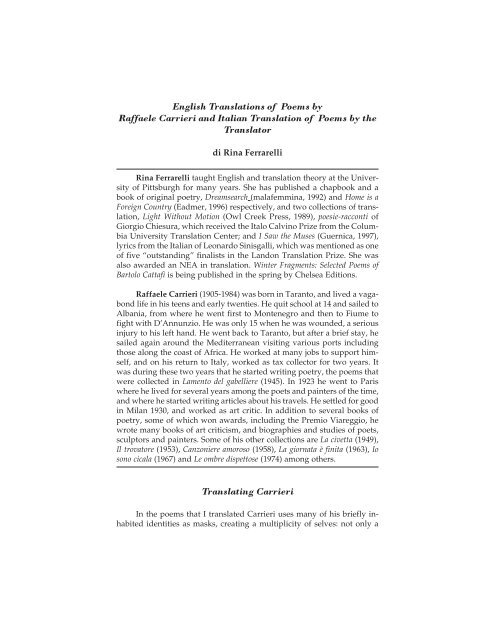Journal of Italian Translation
Journal of Italian Translation
Journal of Italian Translation
Create successful ePaper yourself
Turn your PDF publications into a flip-book with our unique Google optimized e-Paper software.
English <strong>Translation</strong>s <strong>of</strong> Poems by<br />
Raffaele Carrieri and <strong>Italian</strong> <strong>Translation</strong> <strong>of</strong> Poems by the<br />
Translator<br />
di Rina Ferrarelli<br />
Rina Ferrarelli taught English and translation theory at the University<br />
<strong>of</strong> Pittsburgh for many years. She has published a chapbook and a<br />
book <strong>of</strong> original poetry, Dreamsearch (malafemmina, 1992) and Home is a<br />
Foreign Country (Eadmer, 1996) respectively, and two collections <strong>of</strong> translation,<br />
Light Without Motion (Owl Creek Press, 1989), poesie-racconti <strong>of</strong><br />
Giorgio Chiesura, which received the Italo Calvino Prize from the Columbia<br />
University <strong>Translation</strong> Center; and I Saw the Muses (Guernica, 1997),<br />
lyrics from the <strong>Italian</strong> <strong>of</strong> Leonardo Sinisgalli, which was mentioned as one<br />
<strong>of</strong> five “outstanding” finalists in the Landon <strong>Translation</strong> Prize. She was<br />
also awarded an NEA in translation. Winter Fragments: Selected Poems <strong>of</strong><br />
Bartolo Cattafi is being published in the spring by Chelsea Editions.<br />
Raffaele Carrieri (1905-1984) was born in Taranto, and lived a vagabond<br />
life in his teens and early twenties. He quit school at 14 and sailed to<br />
Albania, from where he went first to Montenegro and then to Fiume to<br />
fight with D’Annunzio. He was only 15 when he was wounded, a serious<br />
injury to his left hand. He went back to Taranto, but after a brief stay, he<br />
sailed again around the Mediterranean visiting various ports including<br />
those along the coast <strong>of</strong> Africa. He worked at many jobs to support himself,<br />
and on his return to Italy, worked as tax collector for two years. It<br />
was during these two years that he started writing poetry, the poems that<br />
were collected in Lamento del gabelliere (1945). In 1923 he went to Paris<br />
where he lived for several years among the poets and painters <strong>of</strong> the time,<br />
and where he started writing articles about his travels. He settled for good<br />
in Milan 1930, and worked as art critic. In addition to several books <strong>of</strong><br />
poetry, some <strong>of</strong> which won awards, including the Premio Viareggio, he<br />
wrote many books <strong>of</strong> art criticism, and biographies and studies <strong>of</strong> poets,<br />
sculptors and painters. Some <strong>of</strong> his other collections are La civetta (1949),<br />
Il trovatore (1953), Canzoniere amoroso (1958), La giornata è finita (1963), Io<br />
sono cicala (1967) and Le ombre dispettose (1974) among others.<br />
Translating Carrieri<br />
In the poems that I translated Carrieri uses many <strong>of</strong> his briefly inhabited<br />
identities as masks, creating a multiplicity <strong>of</strong> selves: not only a
















